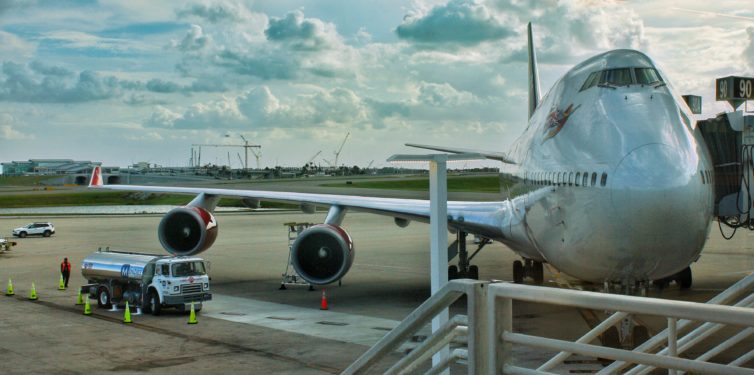
The aviation sector is responsible for roughly two percent of global carbon dioxide emissions. If current trends continue, its share of the total is expected to grow substantially in coming decades. Fortunately, in recent years a number of airlines have made concerted efforts to make flying more environmentally sustainable. Most of the solutions to date have involved biofuels made from plant-based compounds. But Virgin Atlantic took a different approach, partnering with the U.S.-based company LanzaTech that was developing a technology to turn industrial pollution into jet fuel.
On October 2nd, the partnership achieved a major milestone: the first passenger flight powered (in part) by the innovative new fuel. There was plenty of fanfare around the flight, which we were on hand to cover. And though the flight was one incremental step out of many required to make the tech mainstream, it was still a milestone worth celebrating. Read on for our full coverage of the announcement, press conference, and the flight itself — including a surprise appearance by Sir Richard Branson!
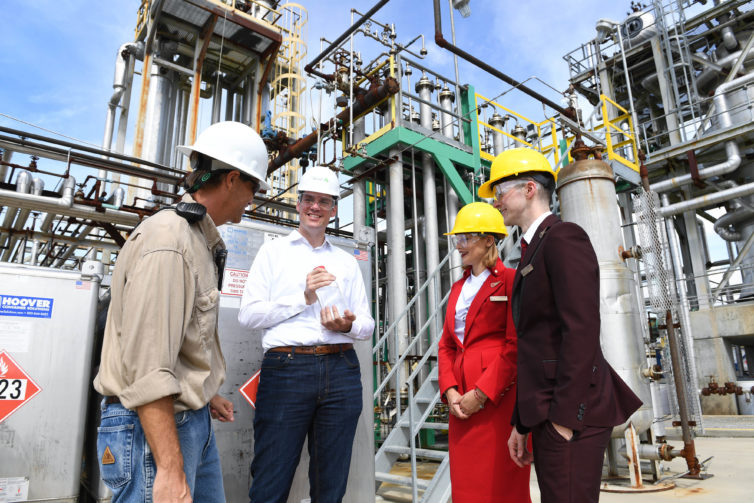
Photo: Doug Peters/PA Wire
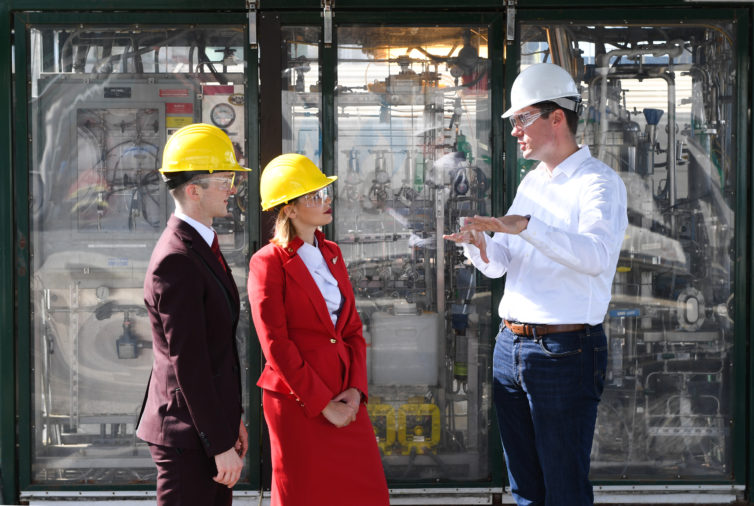
Photo: Doug Peters/PA Wire
It can be hard for the environmentally minded AvGeek to get on a flight without a twinge of guilt, since planes spew tons of carbon dioxide into the atmosphere every minute of every day. Over recent years, the industry has slowly started wising up to the importance of sustainability. We’ve seen some airlines introduce biofuels derived from plant products. But today, the field takes a new leap forward.
The Boeing 747 flying Virgin Atlantic’s flight #16 today from Orlando to London Gatwick will be powered by a unique sustainable jet fuel that’s recycled from carbon-containing waste gases from industries like steel mills. The result is a product that has proven at least as powerful as regular jet fuel but with a significantly lower carbon footprint. The flight is the outcome of a partnership between Virgin Atlantic and LanzaTech, which developed the fuel. Partners like Boeing, Honeywell, GE, fuel suppliers, and the DOE played a significant role as well.
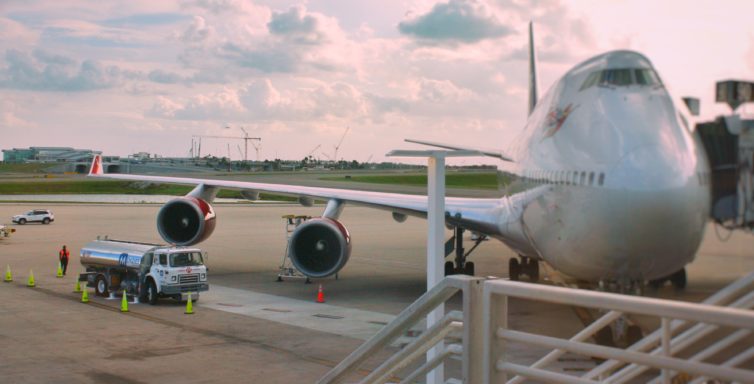
The star of the show. Or stars, if you include the fuel tanker. – Photo: Manu Venkat | AirlineReporter
We’ll be on the inaugural flight and will be back later with a full report. For the time being, check out our Twitter feed for live updates. Here’s to a greener future for aviation!
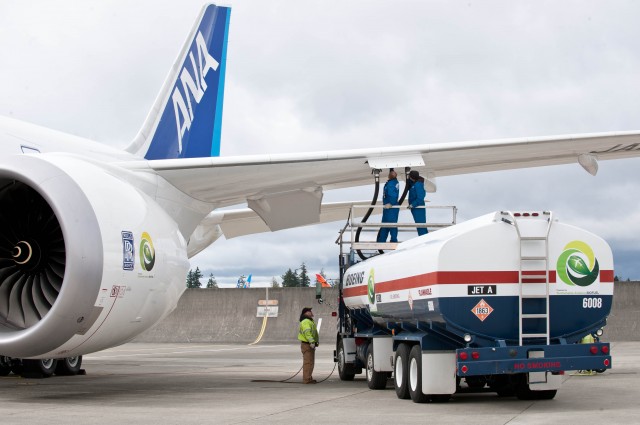
Boeing fills up ANA's 787 Dreamliner with biofuel. Photo from Boeing.
Earlier in the week, Boeing and All Nippon Airways (ANA) made aviation history by flying a 787 Dreamliner using a biofuel blend. There were no passengers on board this delivery flight from Evertt’s Paine Field (KPAE) to Haneda Airport (HND), but there was fuel that was primarly made from used cooking oil that emitted an estimated 10% less CO2 emissions.
’œThe 787 is the most environmentally progressive jetliner flying today, combining fuel efficiency and comfort with reduced carbon emissions,’ said Billy Glover, Commercial Airplanes Vice President of Environment and Aviation Policy.
This is also the first biofuel flight to occur over the pacific ocean.
“Our historic flight using sustainable biofuels across the Pacific Ocean highlights how innovative technology can be used to support our industry’s goal of carbon-neutral growth beyond 2020,’ Osamu Shinobe, ANA senior executive vice president, said.
Although biofuel on airlines is still not a cost effective fuel, with new research and technologies I feel that we will start to see the use of this alternative fuel used more and more, not only on airliners, but also in airport operations.
Other stories on biofuels and airlines:
* Alaska and United Use Biofuel on Scheduled Flights
* Lufthansa is First Airline to Use Biofuel on Schedule Flights
* Boeing, Alaska Airlines and Others Work Towards Using Sustainable Biofuels
* Back in January 2009, Boeing Gives Prediction That Biofuel Flights Will Be Arriving Soon

Today, Alaska Airlines will start their first of 75 flights using abiofuel mixture and they want you to be a part of it. Following along as one flight leaves Seattle for Washington, DC (a Boeing 737) and another leaves for Portland (a Bombardier Q400) using the new fuel.
Who:
* Aviation sustainability experts from Alaska Airlines and Boeing Commercial Airplanes
* And you!
When:
* Today, November 9th from 2:45 pm ’“ 3:45 pm (PST).
Where:
* Sign up online and join our Flying Green Chat, or follow along using hashtag #FlyGreen on Twitter.

Before and after photo. On the left is used cooking oil and on the right is the processed biofuel. Check out the Alaska 737's in the background. Photo from Boeing.
During the flights, Alaska Airlines wants you to share your thoughts on the future of aviation, sustainability and environmental awareness. On the flight to Washington, DC will be Alaska’s top sustainability expect along with other folks in the field. Shorly after take off, you will be able to ask questions about aviation sustainability.
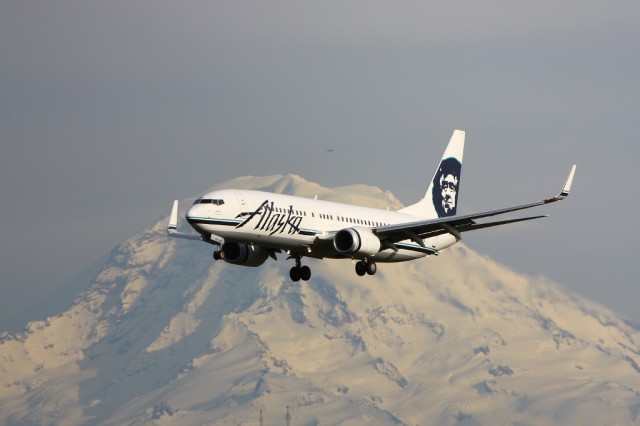
Alaska Airlines Boeing 737 with Mount Rainier in the background. Photo by Brandon Farris.
Alaska Airlines announced yesterday that they will operate 75 regularly schedule flights, using renewable bio-fuels starting tomorrow, November 9th. The maiden flight will leave from Seattle (SEA) to Washington, DC (DCA) and also Portland (PDX). The airline will fuel the aircraft using a 20% blend of biofuel made from used cooking oil.
Alaska is hoping that these flights will help reduce greenhouse gas emissions by about 10%, which is equal to removing 26 cars from the road for a year. The impact of these few flights might seem minor, but if Alaska were to use the 20% biofuel mixture on all their flights, it would be the equivalent of removing 64,000 cars off of the road.
’œThis is a historic week for U.S. aviation.’ Alaska Air Group Chairman and CEO Bill Ayer stated. ’œCommercial airplanes are equipped and ready for biofuels. They will enable us to fly cleaner, foster job growth in a new industry, and can insulate airlines from the volatile price swings of conventional fuel to help make air travel more economical. To the biofuels industry, we say: If you build it, we will buy it.’
The fuel mixture is being supplied by SkyNRG and made by Dynamic Fuels (who is in a partnership with Tyson Foods). These flights by Alaska are part of the Sustainable Aviation Fuels Northwest (SAFN) initiative, which was launched in July 2010 by Alaska Airlines, Boeing, Portland International Airport, Seattle-Tacoma International Airport, Spokane International Airport and Washington State University to promote aviation biofuel development.
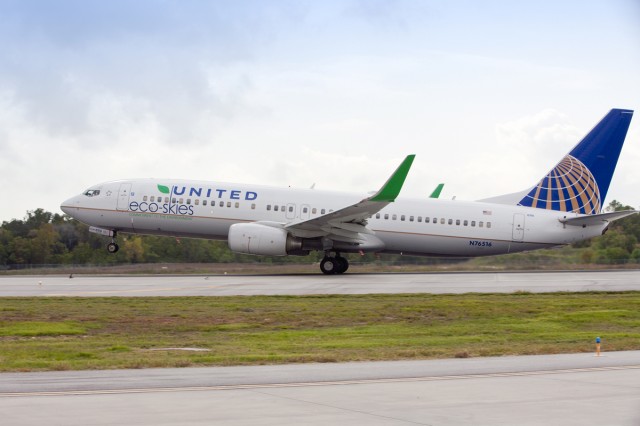
United Airlines's first commercial advanced biofuel flight using a Boeing 737-800 (N76516) takes off from Houston yesterday. Photo by United.
Although there is a lot of excitement in the northwest for Alaska’s first flight on Wednesday, United Airlines operated a scheduled flight using biofuels yesterday, the 7th of November. Flight 1403, a Boeing 737-800, left from Houston’s Bush Intercontinental Aiport (IAH) at about 10:30am local time for Chicago O’Hare International Airport (ORD).
’œUnited is taking a significant step forward to advance the use of environmentally responsible and cost-efficient alternative fuels,’ said Pete McDonald, United’s executive vice president and chief operations officer. ’œSustainable biofuels, produced on a large scale at an economically viable price, can one day play a meaningful role in powering everyone’s trip on an airline.’
United also announced that they have signed a letter of intent to negotiate the purchase of 20 million gallons of biofuel per year, starting as early as 2014
United beat Alaska for a revenue biofuel flight by two days, but it is not clear when or if United will continue the biofuel flights. An email to United to get clarification on their future biofuel flights has not been returned by the time of posting this story.








